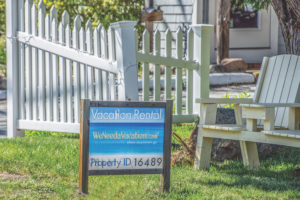PROVINCETOWN — With a real estate market rocket-fueled by the pandemic, housing officials here are calling for action and leadership to secure a larger supply of affordable homes for year-round residents.
“I think we should stop calling it ‘affordable housing,’ ” said housing authority member Ann Wood. “We should call it ‘normal.’ ”
Wood, who was appointed at an Oct. 5 joint meeting of the select board and the housing authority, called on her fellow committee members to become advocates.
“Prices are crazy,” she said. “We need to start the discussion about how to approach the select board to do something, because they are not doing anything.”
The median sale price of a Provincetown condominium was $720,000 in November, according to statistics provided by the Cape and Islands Association of Realtors. That same month, the median sale price of a house in town was over $1.3 million.
According to the Cape Cod Commission, a $700,000 home would be considered “affordable” for a household with annual income of a little over $160,000. But the commission reports that the median income of Provincetown’s 1,760 households is $50,741 — less than a third of what would be needed to own a median-priced condo.
Plans for construction of up to 74 units of housing at the former V.F.W. building were put on hold pending a fire department analysis to see if there is a need to expand the fire station to the V.F.W. site on Jerome Smith Road. Former Town Manager Robin Craver was supposed to act on the V.F.W. plan within her first six months of employment. But she resigned after six months, and there has been no town manager since July.
Though the town has 238 units of affordable housing (nearly 10 percent of the housing stock), the Provincetown Housing Playbook, created by town staff in 2016, found that, to sustain a year-round economy here, Provincetown needs more, said Housing Director Kristin Hatch. Back when the playbook was created, just four years ago, the median price of a single-family home was $790,000, just a little more than the current cost of a condominium.
“I’m seeing one-bedrooms [advertised] on Facebook for $1,800 a month,” said Hatch. “I was shocked. The price of a home is off the charts.”
Housing is the top priority of the select board, said Hatch. Yet there persists a lack of political will and continual NIMBY (not in my back yard) battles, as well as inertia, she added.
The housing authority itself, which is supposed to have five elected members, is still one member shy of a full roster. Wood was appointed to fill one of the vacant positions.
“I hope if we start making noise and get something done, people will start running for this board,” said Wood, a former reporter and editor of the Provincetown Banner.
The pandemic has also raised housing prices in the neighboring towns, where restaurant and other seasonal workers once found affordable options.
The median sale price of a single-family home in Truro was $1,260,000 in November, up 9.6 percent from a year earlier. In Wellfleet, the median was $762,500, up 13 percent; and in Eastham it was $625,000, up 12.5 percent, according to the Realtors association.
Condominiums in the neighboring towns are less expensive than in Provincetown. But with demand far outpacing supply, few homes are available at any price.
Housing inventory has fallen dramatically: compared to November 2019, there were 61 percent fewer homes for sale in Truro, 50 percent fewer in Wellfleet, and 63 percent fewer in Eastham. Provincetown’s inventory was down 55 percent.
Some real estate professionals sound alarmed even as they rake in piles of cash.
“Real estate on Cape Cod, Martha’s Vineyard, and Nantucket is leading the economic recovery,” said Ryan Castle of the Association of Realtors. “Yet, over the long term, the demand has given us a massive decline in available homes for sale and is harming housing affordability across Barnstable County.”
Alisa Magnotta, CEO of the nonprofit Housing Assistance Corp., calls this a “tale of two Covids.”
“The effect of Covid on our fragile seasonal economy has increased the number of people who struggle financially,” she said. “While on the other end of the economic scale, Covid has created a banner year for the real estate sector.”
Income loss related to the pandemic has been evident in the number of requests for help, said Magnotta. Early in the pandemic, the Housing Assistance Corp. saw a 325-percent increase in foreclosure prevention requests and a 413-percent increase in calls for help with past-due rent, according to an announcement from HAC.
And that was before the real estate market exploded.
“The town needs to build the police station and get some affordable housing,” said Ann Wood. “Now.”
Workforce Fund: How to Help
The Housing Assistance Corporation’s Workforce Housing Relief Fund provides urgent assistance with past-due rent or mortgage payments or other housing-related expenses for Cape Cod and Islands residents who are losing income due to the coronavirus. The fund provides a safety net for residents who don’t qualify for public assistance and who earn up to 100 percent of the area median income for Barnstable, Nantucket, or Dukes counties. The fund was created with a $20,000 contribution from the Cape and Islands Association of Realtors and its members. So far, 300 families have been helped by the fund, according to the Housing Assistance Corporation. To make a donation, visit the Workforce Housing Relief Fund donation page: charity.gofundme.com/o/en/campaign/workforcehousingrelieffund

